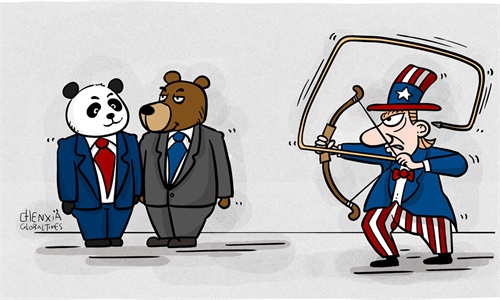
Illustration: Chen Xia/GT
Despite the strong complementarity and resilience of China-Germany economic and trade relations, there are geopolitical factors that may affect further growth in bilateral trade. With new changes emerging, the urgency to address these issues and deepen China-Germany trade is increasing.The US overtook China as Germany's biggest trading partner in the first half of 2024, German media outlet Deutsche Welle reported on Friday. German imports and exports to the US totaled about 127 billion euros ($139 billion) in the January-June period, while its trade with China was 122 billion euros, according to Reuters' calculations based on preliminary German Federal Statistical Office data.
After eight consecutive years of China being Germany's largest trading partner, the shift comes as global trade is increasingly influenced by geopolitics. Against this backdrop, US-Germany trade and China-Germany trade actually do not have much comparability. While both China and the US are important trading partners for Germany, the geopolitical environment, trade structures and development trends vary greatly in their trade with Germany.
In particular, the US, as Germany's ally, has deep strategic ties with Germany, and the two sides have close cooperation in politics and security that contributes to promoting trade cooperation. In contrast, despite close trade relations between China and Germany, the negative impact of geopolitical factors is becoming more and more prominent.
However, the fact that practical economic and trade cooperation between China and Germany has maintained steady development even in the face of unprecedented international changes is sufficient to reflect the economic importance of the Chinese market to Germany. According to the Deutsche Welle report, in recent years, in order to reduce the potential impact of geopolitical factors, German companies have increased their investments in China, making the supply chain more localized, which has reduced direct exports from Germany to China.
Still, there are concerning signs in bilateral trade. Given the growing significance of geopolitics in global trade, there is every reason to be worried about potential obstacles that could impede the further strengthening of economic and trade ties between China and Germany.
The US "decoupling" push targeting China, especially its pressure that aims to force European allies to take similar measures on security issues, has caused serious disruption to global supply and industrial chains, becoming a source of uncertainty in China-Germany trade relations. For instance, Germany will phase out components made by China's Huawei and ZTE from its 5G wireless network over the next five years, CNN reported last month. The Chinese Embassy in Germany said in a statement that Germany's move "seriously damages mutual trust between the two sides, and will also affect future cooperation between China and Europe in related fields."
Such geopolitical headwinds are clearly not conducive to unleashing the potential of China-Germany economic and trade cooperation. China and Germany have strong cooperation needs and potential in areas such as automobiles, chemicals, power generation equipment and transportation, with many new cooperation opportunities emerging in areas such as the green transformation, climate change, new-energy industries and the digital economy. This is why, despite geopolitical tensions, the German business community has always valued the development opportunities and cooperation potential in the Chinese market.
Therefore, how to overcome obstacles in the current geopolitical environment and further deepen bilateral trade has become an urgent issue that requires joint efforts.
First, both sides need to strengthen communication to improve political mutual trust, especially when it comes to reducing the influence of US strategy and avoiding being led by the US.
Second, both sides need to enhance coordination to reduce trade barriers. China is willing to create more favorable conditions for German companies to invest in China, and we hope that Germany will work toward reducing trade barriers against China in the EU.
Third, both sides can boost trade in the services sector. We oppose the generalization of the security concept in trade issues, which is affecting services trade between the two sides. While it may be difficult to address the issue, we are willing to collaborate with Germany in this area, as it holds the greatest potential for China-Germany trade.



